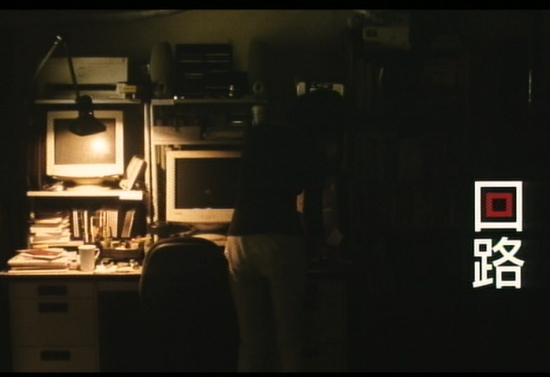Kairo (Pulse), 2001

Are there any ghosts in the Japanese film Kairo? It's hard to say. The truth is, there are several shadowy figures in the movie that appear and then disappear, silent and lonely as they wander the Earth searching for something that may not exist. However, these people aren't even dead yet.
Kairo, which translates to "Pulse," was directed by Kiyoshi Kurosawa, who also wrote the novel. This film was treated to the Hollywood remake machine in 2006, and while I haven't seen the American Pulse, I have good reason not to. From what I hear, the American version is about a computer virus that has breached the boundary between life and death, allowing scary malevolent spirits to jump out of people's computer screens and attack blonde girls. As I watched the original Japanese film, I was surprised that Hollywood would even think of remaking it, considering they basically scrapped every element that makes Kairo so effective (including a pretty non-blonde actress like Kumiko Aso).

Admittedly, like some other Japanese horror films, Kairo is a bit hard to follow. The parallel storylines and lack of explanation may discourage viewers expecting some straightforward, scary ghosts. But this movie isn't about evil spirits jumping out at you or dramatic music bursts, and maybe that's why I like it so much. There are no quick cuts or narrow escapes, and even the assumed premise of good vs. evil/living vs. dead dissolves as the story unfolds. You may not find an explanation for everything that happens in this movie, but Kairo does leave you with some interesting questions:
What if the metaphysical space we call the afterlife had reached its maximum capacity, causing spirits to leak back into our realm through certain man-made portals?
What if death, instead of being a grand journey towards meaning, was merely a continuation of our lonely existence on Earth?
What if human beings, confronted with the fact that they will never be more than social atoms, simply gave up and disappeared, leaving nothing but a shadow-like mark on the wall? Once everyone you know had vanished, how long would you keep living before you opted to join them?
Perhaps, for the characters in Kairo, seeing a ghost is terrifying due to the fact that they might be doomed to become one. The existence of ghosts confirms everything they hoped wasn't true, the possibility that instead of resting in peace you end up walking in place, like the figure in a video Kawashima finds looping over and over on a laptop screen.

Several shadowy figures appear in webcam videos throughout the film. Are they ghosts? Or are they just lonely shut-ins, dead to the world but not actually dead? The internet plays an important role in this movie, both to illustrate Kurosawa's theme of a socially disconnected society and also as the most puzzling story element. In any case, the long shots of grainy dark webcam feeds, framed by the edges of the computer monitor, are one example of the director using simple techniques to make some genuinely creepy scenes. Kairo doesn't go for any quick, intense scares. The film is slow, but the feeling of dread gradually increases, and elements that were creepy at the beginning only continue to get creepier. Kurosawa constructs an uncomfortable atmosphere thanks in large part to the objective quality of the camerawork. Some scenes unfold as though we are watching through a security camera, and other times we seem to be looking through a character's eyes, fixed and unblinking, trying to figure out if there is something standing right there in the shadows. And sometimes there is. The scenes involving ghosts are surreal in a David Lynch kind of way, when the camerawork and the audio transcend the traditional movie feel and create a nightmarish sense of unease. There is one scene in particular, near the end, that gave me honest-to-goodness goosebumbs, partially because I loved how it was shot but also because I was just plain freaked the freak out.

While Kairo is slow-paced, a bit confusing, and altogether strange, I would like to see more movies like it. It's refreshing to see a director leave the textbook horror movie cliches behind and start from scratch. When you think about it, scaring people isn't very difficult, and it's about time filmmakers bring a different approach to doing so.
.

No comments:
Post a Comment